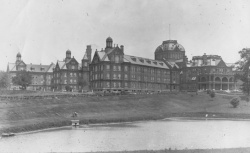Difference between revisions of "Evansville State Hospital"
m |
|||
| (7 intermediate revisions by 2 users not shown) | |||
| Line 11: | Line 11: | ||
| closed = | | closed = | ||
| demolished = 2002-2008 | | demolished = 2002-2008 | ||
| − | | current_status = [[Active | + | | current_status = [[Demolished Institution|Demolished]] (Original)<br>[[Active Institution|Active]] |
| − | | building_style = [[ | + | | building_style = [[Pavilion Plan Institutions|Pavilion Plan]] (Radial) |
| architect(s) = | | architect(s) = | ||
| location = Evansville, IN | | location = Evansville, IN | ||
| architecture_style = Gothic Revival | | architecture_style = Gothic Revival | ||
| peak_patient_population = 1,500 est. in 1954 | | peak_patient_population = 1,500 est. in 1954 | ||
| − | | alternate_names = | + | | alternate_names =<br> |
| − | Woodmere Asylum | + | *Woodmere Asylum |
| − | Southern Indiana Hospital for the Insane | + | *Southern Indiana Hospital for the Insane |
}} | }} | ||
== History == | == History == | ||
| − | A general treatment facility with a long, rich history. Also referred to as "Woodmere", Evansville provided solitude and peace for mentally-ill patients. While Central State Hospital was a progressive force in scientific medicine in the early 20th century, Evansville remained largely a custodial institution. | + | In 1883, Indiana's Legislature authorized funding for the construction of a new facility in Evansville to treat mentally ill patients. A secluded, densely wooded farm on Newburgh Road (now Lincoln Avenue), then three miles outside of the city, was selected as the site, and on Oct. 30, 1890, the new hospital admitted its first two patients. Known in its early years as Woodmere ("tranquility in the forest") The hospital was built on 160 acres of land on Newburgh Road, now known as Lincoln Avenue, between Evansville and Newburgh. The campus quickly expanded, eventually holding nearly 900 acres of what is now the East Side of Evansville, including the land eventually repurposed for Robert Stadium, St. Mary’s Medical Center and Wesselman’s Woods Nature Preserve. Using patient labor, the hospital staffed a working farm, including dairy cows, poultry and an orchard. |
| + | |||
| + | A general treatment facility with a long, rich history. Also referred to as "Woodmere", Evansville provided solitude and peace for mentally-ill patients. While Central State Hospital was a progressive force in scientific medicine in the early 20th century, Evansville remained largely a custodial institution. On February 9, 1943, a fire set by an attendant destroyed much of the original building, leaving at least two staff members dead and six patients missing. It was replaced later that year by a "U" shaped building, referred to as the Continuing Treatment Unit. By the late 1990s a new facility was being built & all the old structures were demolished by 2008. The hospital continues to serve southwestern Indiana in it's new facility. | ||
== Images of Evansville State Hospital == | == Images of Evansville State Hospital == | ||
| Line 34: | Line 36: | ||
</gallery> | </gallery> | ||
| − | |||
| − | |||
[[Category:Indiana]] | [[Category:Indiana]] | ||
| − | [[Category: | + | [[Category:Pavilion Plan]] |
[[Category:Active Institution]] | [[Category:Active Institution]] | ||
| − | [[Category: | + | [[Category:Institution With A Cemetery]] |
Latest revision as of 08:53, 10 February 2021
| Evansville State Hospital | |
|---|---|
 | |
| Construction Began | 1888 |
| Opened | 1890 |
| Demolished | 2002-2008 |
| Current Status | Demolished (Original) Active |
| Building Style | Pavilion Plan (Radial) |
| Location | Evansville, IN |
| Architecture Style | Gothic Revival |
| Peak Patient Population | 1,500 est. in 1954 |
| Alternate Names |
|
History[edit]
In 1883, Indiana's Legislature authorized funding for the construction of a new facility in Evansville to treat mentally ill patients. A secluded, densely wooded farm on Newburgh Road (now Lincoln Avenue), then three miles outside of the city, was selected as the site, and on Oct. 30, 1890, the new hospital admitted its first two patients. Known in its early years as Woodmere ("tranquility in the forest") The hospital was built on 160 acres of land on Newburgh Road, now known as Lincoln Avenue, between Evansville and Newburgh. The campus quickly expanded, eventually holding nearly 900 acres of what is now the East Side of Evansville, including the land eventually repurposed for Robert Stadium, St. Mary’s Medical Center and Wesselman’s Woods Nature Preserve. Using patient labor, the hospital staffed a working farm, including dairy cows, poultry and an orchard.
A general treatment facility with a long, rich history. Also referred to as "Woodmere", Evansville provided solitude and peace for mentally-ill patients. While Central State Hospital was a progressive force in scientific medicine in the early 20th century, Evansville remained largely a custodial institution. On February 9, 1943, a fire set by an attendant destroyed much of the original building, leaving at least two staff members dead and six patients missing. It was replaced later that year by a "U" shaped building, referred to as the Continuing Treatment Unit. By the late 1990s a new facility was being built & all the old structures were demolished by 2008. The hospital continues to serve southwestern Indiana in it's new facility.
Images of Evansville State Hospital[edit]
Main Image Gallery: Evansville State Hospital


